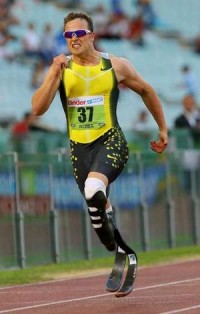
An international court ruled on Friday that South African Oscar Pistorius can once again return to the track. A sprinter, hoping to even make the Beijing Olympics, Pistorius has had to fight through more than your average athlete though. Miles and miles of red tape, bad scientific reporting, and, oh yeah, he’s an amputee.
The 21-year-old is known as “the fastest man on no legs” and “Blade Runner”, referring to the prosthetic limbs that look like a pair of blades, known as “Cheetah Flex-Foot”. The carbon fibre transtibial artificial limbs were what put him in trouble though, when the International Association of Athletics Federation (IAFF) banned him from competing.
The IAFF’s theory was that his prosthetic limbs gave him an added advantage over other athletes, and he has had to subsequently spend the past 6 months in court, fighting this decision, rather than training.
Peter Weyand, a biomechanist at Rice University in Houston, led Pistorius’ testing, and found that the young man burnt just as much energy as any other athlete. If the limbs gave him an added advantage, he would end up burning fewer calories than those performing at the same level as he.
The IAFF also based their original decision on the odd method of pacing that Pistorius uses when he runs. For most 400-meter sprinters, the first half of the race is their fastest whereas the second shows a decrease in their speed. However for Pistorius, it is the other way around. "He can run a good 100 metres, a better 200 metres, and an even better 400 metres," Weyand says.
In their infinite and unscientifically backed wisdom, the IAFF assumed that this meant he got an advantage from the Cheetahs. But treadmill tests eventually proved that Pistorius eventually lost speed, in addition to having a slower start.
Weyand’s team pointed to the IAFF’s science as being either over-interpreted, or in some cases simply inaccurate. One of the IAFF’s claims, that Pistorius runs 25% more efficiently than able-bodied runners, is simply incorrect according to Hugh Herr, a researcher at the Massachusetts Institute of Technology in Cambridge, US, who presented Pistorius's case.
Thankfully there still appears to be time for Oscar Pistorius, the Blade Runner, to qualify for the Olympics, and after hearing his story for the first time in researching this piece, I really hope he does!
A Geek’s-Geek from Melbourne, Australia, Josh is an aspiring author with dreams of publishing his epic fantasy, currently in the works, sometime in the next 5 years. A techie, nerd, sci-fi nut and bookworm An international court ruled on Friday that South African Oscar Pistorius can once again return to the track. A sprinter, hoping to even make the Beijing Olympics, Pistorius has had to fight through more than your average athlete though. Miles and miles of red tape, bad scientific reporting, and, oh yeah, he’s an amputee.
The 21-year-old is known as “the fastest man on no legs” and “Blade Runner”, referring to the prosthetic limbs that look like a pair of blades, known as “Cheetah Flex-Foot”. The carbon fibre transtibial artificial limbs were what put him in trouble though, when the International Association of Athletics Federation (IAFF) banned him from competing.
The IAFF’s theory was that his prosthetic limbs gave him an added advantage over other athletes, and he has had to subsequently spend the past 6 months in court, fighting this decision, rather than training.
An international court ruled on Friday that South African Oscar Pistorius can once again return to the track. A sprinter, hoping to even make the Beijing Olympics, Pistorius has had to fight through more than your average athlete though. Miles and miles of red tape, bad scientific reporting, and, oh yeah, he’s an amputee.
The 21-year-old is known as “the fastest man on no legs” and “Blade Runner”, referring to the prosthetic limbs that look like a pair of blades, known as “Cheetah Flex-Foot”. The carbon fibre transtibial artificial limbs were what put him in trouble though, when the International Association of Athletics Federation (IAFF) banned him from competing.
The IAFF’s theory was that his prosthetic limbs gave him an added advantage over other athletes, and he has had to subsequently spend the past 6 months in court, fighting this decision, rather than training.